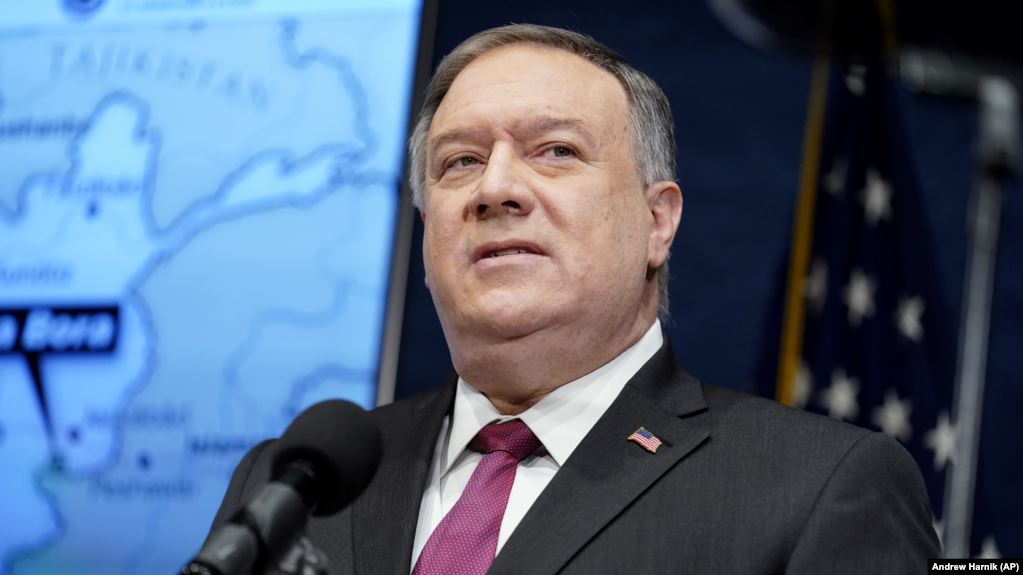
By Polygraph
Press TV
Iranian state TV channel
“Pompeo’s allegations come although all the US’ previous such accusations, including those made by former president George W. Bush’s administration — during which al-Qaida’s 9/11 attacks against the US took place — have been discredited.”
Source: Press TV, January 14, 2021
FALSE
On January 14, Iran’s Press TV state news service published an article that quoted an unnamed Syrian foreign ministry official as dismissing U.S. claims of collaboration between Iran and the terrorist group al-Qaida.
Iran is a staunch ally of the Syrian regime of Bashar al-Assad. The Syrian foreign ministry official’s comments were in response to U.S. Secretary of State Mike Pompeo’s claim, made during a January 12 speech, that the Islamic Republic of Iran had become the “new home base” of the terrorist group. Pompeo also referred to an “Iran al-Qaida axis.”
Press TV quoted the Syrian official as saying that the accusation “fits the framework of the U.S.’ hysteric (sic) campaign against Iran,” and that Syria expresses its “extreme denunciation and astonishment at the claim.”
Press TV added: “Pompeo’s allegations come although all the U.S.’ previous such accusations, including those made by former president George W. Bush’s administration — during which al-Qaida’s 9/11 attacks against the US took place — have been discredited.”
That is false.
While some terrorism experts criticized Pompeo’s talk of Iran as a “new home base” of al-Qaeda as an exaggeration, evidence that Iran and al-Qaida collaborated, especially during the George W. Bush administration, is well-established and has never been “discredited.”
In his speech, Pompeo referred to Abdullah Ahmed Abdullah, aka Abu Muhammed al Masri, who was assassinated in Iran in November 2020. Abdullah was both a founder of and second-in-command of al-Qaida. He reportedly had been in Iranian custody since 2003, but, starting in 2015, lived in a suburb of the capital Tehran.
Iran denied al-Masri’s presence and assassination. However, independent Iranian sources, as well as al-Qaida-linked sources outside Iran, suggest al-Masri was indeed in Iran.
In his speech, Pompeo referred to Abdullah Ahmed Abdullah, aka Abu Muhammed al Masri, who was assassinated in Iran in November 2020. Abdullah was both a founder of and second-in-command of al-Qaida. He reportedly had been in Iranian custody since 2003, but, starting in 2015, lived in a suburb of the capital Tehran.
Iran denied al-Masri’s presence and assassination. However, independent Iranian sources, as well as al-Qaida-linked sources outside Iran, suggest al-Masri was indeed in Iran.
Al-Masri was by no means the only important al-Qaida-linked individual to receive refuge in Iran. Arguably the most notorious was Ahmad Fadeel al-Nazal al-Khalayleh, better known as Abu Musab al-Zarqawi.
Although the Jordanian al-Zarqawi was never a member of al-Qaida’s inner circle, he received money from Osama bin Laden to start up his own jihadist group in Afghanistan in the years immediately preceding the September 11, 2001 terrorist attacks. During the post-9/11 U.S. invasion of Afghanistan, al-Zarqawi was severely injured and sought refuge in Iran, where he recuperated.
From there, he was allowed to travel to northern Iraq. After the U.S. invasion of that country in 2003, al-Zarqawi formed one of Iraq’s most dangerous insurgent groups, al-Qaida in Iraq, which evolved into the Islamic State group.
Another top al-Qaida leader long believed to be in Iran is Saif al-Adel. An Egyptian national, he reportedly planned the 1998 U.S. embassy bombings in Kenya and Tanzania, as well as a 2003 bombing in Riyadh, Saudi Arabia.
According to some reports, al-Adel, like other al-Qaida members and some of Osama bin Laden’s relatives, was placed under house arrest in Iran after fleeing the U.S. invasion of Afghanistan, but later freed from house arrest and left Iran in 2008. One account has him returning to Iran in 2011; others say he never left Iran or at least is currently there.
Much of this information comes from al-Qaida sources, via interviews and interrogations and captured documents. In the 2011 raid on the Abbotabad compound in Pakistan, where al-Qaida leader Bin Laden had been hiding, U.S. forces captured a massive cache of intelligence material, including correspondence between Bin Laden and senior al-Qaida members hiding in Iran.
Most of these documents were declassified and made public in 2017. They paint a picture of an alliance of convenience between al-Qaida and the Iranian regime. Therefore, while some called Pompeo’s claim that the Islamic Republic has become al-Qaida’s “new home base” an exaggeration, Iran’s denial of any relationship is itself exaggerated.
By Polygraph




